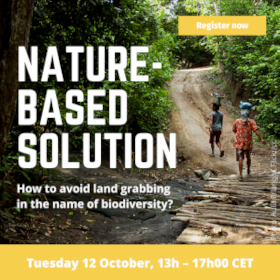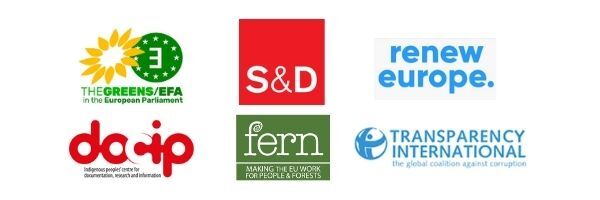1:00 PM – Introduction by Michèle Rivasi, Maria Soraya Rodriguez Ramos, Marie-Ange Kalenga and Joan Carling
1:15 PM – Panel 1: What are Nature-based solutions, offsetting and financialisation? What is at stake?
With
- Frédéric Hache, Co-founder and Executive Director of Green Finance Observatory
- Alain Frechette, Director for Strategic Analysis and Global Engagement, Rights and Resources Initiative
- Roselyn Fosuah Adjei, Director of Climate Change at Ghana's Forestry Commission and National REDD+ Focal Point (TBC)
1:45 PM – Q&A
2:00 PM – Panel 2: Financialisation of nature and its impact on Indigenous Peoples and local communities - Views and experiences across regions and recommendations
With
- Vũ Thị Bích Hợp, Executive Director, Center for Sustainable Rural Development & Hoang Thi Ngoc Ha, Director, The Center for Eco-Community Development (ECODE), Vietnam
- Joseph Itongwa, Coordinator, Réseau des Populations Autochtones et Locales pour la Gestion des Ecosystèmes Forestiers d'Afrique Centrale (REPALEAC), Democratic Republic of Congo
- Elle Merete Omma, Head of EU Unit, Saami Council, Norway.
- Joan Carling, Member of Caucus and Member of Indigenous Peoples Major Group for Sustainable Development (IPMGSD), Philippines
2:40 PM – Q&A
2:55 PM – Coffee break - Video & Poll
3:10 PM – Panel 3: Will Nature-based solutions continue the status quo?
With
- Bart Vandewaetere, VP Corporate Communications & ESG Engagement, Nestlé EMENA
- Marc Sadler, Manager of the Climate Funds Management unit at the World Bank
- Brice Böhmer, Climate and Environment Lead, Transparency International
15h40 – Q&A
4:00 PM – Panel 4: How can the EU prevent land grabbing and human rights violations linked to Nature-based Solutions?
With
- Karin Zaunberger, Biodiversity Unit, Directorate-General Environment, European Commission
- Terence Hay-Edie, Programme Advisor, Global Environment Facility (GEF) Small Grants Programme/United Nations Development Programme (UNDP)
- Eva Mayerhofer, Senior Environment and Biodiversity Specialist, European Investment Bank.
4:30 PM – Q&A
4:45 PM – Conclusions by Marc Tarabella (TBC) and Michèle Rivasi









 Online conference
Online conference